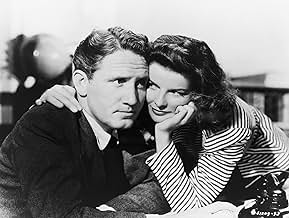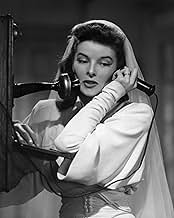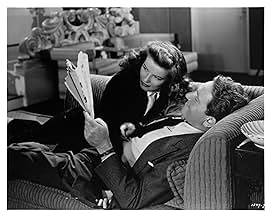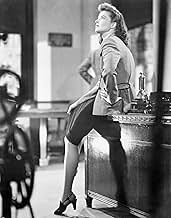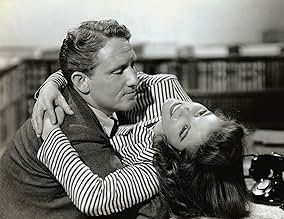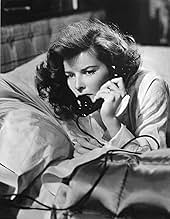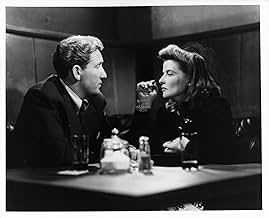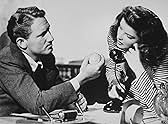Ajouter une intrigue dans votre langueSportswriter Sam Craig and columnist Tess Harding, with the same New York newspaper, overcome their initial antagonism, fall in love and get married, only to find their relationship strained... Tout lireSportswriter Sam Craig and columnist Tess Harding, with the same New York newspaper, overcome their initial antagonism, fall in love and get married, only to find their relationship strained when he comes to resent her hectic lifestyle.Sportswriter Sam Craig and columnist Tess Harding, with the same New York newspaper, overcome their initial antagonism, fall in love and get married, only to find their relationship strained when he comes to resent her hectic lifestyle.
- Réalisation
- Scénario
- Casting principal
- Récompensé par 1 Oscar
- 5 victoires et 2 nominations au total
- Dr. Lubbeck
- (as Ludwig Stossel)
- Cab Driver
- (non crédité)
- Stage Doorman
- (non crédité)
- Phone Girl
- (non crédité)
- Baseball Fan
- (non crédité)
Avis à la une
Tess and Sam meet when they have a war of words in their articles over baseball, and when the editor tells them to make up, that is when they begin seeing each other. Now Tess doesn't hide how busy she is, or how full her apartment often is of people from all over the world that she knows, yet Sam marries her and I get the feeling that he is disappointed that nothing changes. Their wedding being practically a drive through affair should have given him a hint.
So naturally the marriage eventually fails when Sam walks out. That is Tess' first surprise. Her second surprise is when the woman she has patterned herself after for years and years, Ellen Whitcomb (Fay Bainter), makes a totally unexpected, but not unwelcome, move. How does this all work out? Watch and find out.
I'm not sure this film is ultimately sexist or feminist. It does look like the script was trying to paint Hepburn's character as an ice queen, and she just acted her way out of being portrayed in that fashion. She ultimately plays it as a person who, if she takes up a task, goes all the way with it, right down to the humorous scene where she tries to make breakfast and acts like every utensil in the kitchen is from another planet, yet she persists in the face of hilarious adversity and inexperience. However, if you turn the roles of Sam and Tess around, you could say this was a feminist film, maybe giving men a dose of their own 1942 medicine when they expected women to just live with whatever work schedule the man had, even if they sat home alone at nights.
I'd highly recommend this as one of the great romantic films, and they didn't make many of those during WWII outside of Casablanca.
The scenario is simple; Beautiful, brilliant Claire Booth Luce-type journalist(Hepburn) and practical, salt-of-the-earth sportswriter (Tracy) clash over whether athletic events should be suspended for the duration of the war (she finds them too frivolous in such serious times, he believes them essential for morale). After she makes some insensitive comments on the radio, he criticizes her in his sports column. Despite the paper-selling feud that results, their editor brings them together to make peace...and the pair, seeing one another in person for the first time, fall in love! Despite their busy schedules, he takes her to a ball game (which she loves) and she introduces him to her international friends (which he doesn't). Nonetheless, they marry, but he quickly discovers she is so busy 'saving the world' that she can't make time for him...and then she 'adopts' a war orphan, without consulting him, or considering how little time for 'motherhood' she's willing to give. He realizes a drastic step must be taken, as she is clueless about what being a 'wife' and 'mother' means...
While the domesticity scene concluding the film seems out of place (the story goes that MGM added it to make Tracy the 'winner' of the 'battle of the sexes', to a much more chauvinistic 40s audience), so many scenes ring true that the film goes beyond simple comedy/drama to a timeless statement about commitment, priorities, and accountability for one's actions. And despite the serious issues raised, it makes you laugh, too! Hepburn's reactions at the ball game, and Tracy, trying to be inconspicuous at the women's club meeting, are among the comic highlights. The star duo are so natural together that it's hard to believe this was their first teaming, and the chemistry carried over into their private lives as well, beginning a romance that lasted 25 years.
WOMAN OF THE YEAR is, deservedly, a classic!
This isn't to say that the film is without flaws. Far from it. The writing is clipped and most of the words on their own have little spark. (It takes Spencer Tracy's glowering eyes, or Katharine Hepburn's radiant smile, to add life to those words.) Even the relationship between Sam and Tess isn't set up in the most fluid of ways, leap-frogging from moment to moment, from scene to scene, without quite making the necessary connections--if you believe in Sam and Tess together (and I do), it's only because you can truly believe in Tracy and Hepburn together. The film occasionally feels like a play cobbled together from various scenes, until it hits its stride midway through the film (after Sam and Tess get married).
Script aside, the plot is interesting, and certainly quite radical for its time. However, the ending (a hilarious set-piece of comedy though it might be) leaves things largely unresolved. We have a wonderful, strong female character in Tess Harding--this is clear enough in the first half of the film. But her strength, her forceful personality and go-getting attitude, become her weakness in the second half, so much so that she becomes almost a caricature of the original Tess Harding. Some of the things she does (her 'humanitarian' wholesale adoption of Chris, for example; her rudeness and blithe ignorance of Sam's worth) are truly reprehensible, and the point the writers are making is clear--a female who tries too hard to be a male loses her feminity, and cannot ever really be fulfilled. In this sense, the gender politics, as other commenters have pointed out, is 'deplorable'.
And yet there is a grain of truth in it; if one *can* be brought to believe that Tess could really treat Chris and Sam in the way she does, one can't help but applaud Sam's decision to leave. The role reversal is almost complete--Sam himself comments on the fact that she 'makes love' to him to smooth over their quarrels. She charges on her own merry way without asking him about his life, his opinion, or anything that remotely matters to him. Their union was neither perfect, nor a marriage, as he justifiably charges.
The uneasy tension between the admirable and the deplorable Tess Hardings comes at the end: you most certainly get the impression that the film itself didn't quite know whether or not to affirm the Tess character. In fact, by all accounts (even Hepburn's own), the film originally ended with an unqualified affirmation of Tess's character--promising to be more involved in her husband's life, Tess is depicted at a baseball game, cheering alongside Sam, getting louder and louder and rising higher in her seat above him. It was both an affirmation of Tess the character, and a lingering question mark about the Harding-Craig reunion.
Test audiences didn't like it. (Apparently, it was the *women* who felt threatened by the character Hepburn portrayed on screen. She was too strong, too beautiful, too *everything* all at once.)
What transpired in the end, then, was a re-shot ending that muddied the moral of the film in suggesting that women could not really be fulfilled without their men. Sam wants her to be Tess Harding Craig; she wants to be Mrs. Craig; she wants to change; he thinks (and probably knows) she can't. The logical ending would have seen Tess, cast as she had been in the traditional masculine role, wooing Sam back, only to cast doubt over whether her atypical (for the time) strength as a female would unequivocally threaten the typical male figure as embodied in Tracy's character. The original ending would have better borne out the logic of the film--a valuable DVD extra if ever there was one. You can perhaps applaud the spirit of the film, without accepting the fact that it seems to let that spirit fade away in the end.
So what is there of worth in WOMAN OF THE YEAR, with its original ending gone, and its revolutionary potential muted by a slapstick scene in a kitchen with exploding waffles, too much coffee, and a woman who just can't seem to figure out how to separate eggs? Well, the answer is simple, and it's already been given. This is a movie to watch, and to watch *again*, because it is the first cinematic pairing of Spencer Tracy and Katharine Hepburn. For a couple of hours, you're allowed to watch these two great, mythical actors playing two people in love... while falling in love themselves. That is most certainly a rare privilege, if ever there was one.
However, rather than the comic fireworks generated by their later collaboration, 1949's "Adam's Rib", this film treads in unexpectedly sentimental melodrama, especially in the episodes where Tess has to let go of a Greek orphan she wants to adopt and in the climactic scene when she tearfully recognizes her wifely responsibilities as her aunt Ellen marries her father. Still, the pair's familiar bantering occurs when Sam explains the rules of baseball to Tess and in the final feminist reversal as she fails miserably in her attempt at domesticity. George Stevens directed the film, and he displays his sure hand with actors and an acute sense of craftsmanship throughout. Intriguingly, for a Tracy-Hepburn vehicle, it feels much more like her movie than his, and consequently their rapport is not quite up to their normal standard here. The supporting characters also feel more incidental here, even though Fay Bainter shines briefly as Ellen. It's not my favorite of their films together, but it is certainly required viewing for their fans. There are no extras with the 2000 DVD.
Le saviez-vous
- AnecdotesKatharine Hepburn refused to reveal who wrote the screen play to Louis B. Mayer until after he bought the project from Hepburn. Hepburn was afraid that Mayer would low-ball the two authors (Michael Kanin and Ring Lardner Jr.) because, at the time, they were both relatively unknown.
- GaffesIn the kitchen, Tess uses a vacuum coffee maker (Cona). However, if she had put the coffee in the bottom of the coffee maker and the water in the top, as shown, it wouldn't have made coffee at all.
- Citations
Tess Harding: [In the stands at the ballpark, observing the large crowd in attendance] Are all these people unemployed?
Sam Craig: No, they're all attending their grandmother's funeral.
- Versions alternativesThere is an Italian edition of this film on DVD, distributed by DNA Srl: "LA DONNA DEL GIORNO (1942) + INCANTESIMO (1938)" (2 Films on a single DVD, with "Woman of the Year" in double version 1.33:1 and 1.78:1), re-edited with the contribution of film historian Riccardo Cusin. This version is also available for streaming on some platforms.
- ConnexionsFeatured in George Stevens: A Filmmaker's Journey (1984)
- Bandes originalesBridal Chorus (Here Comes the Bride)
(1850) (uncredited)
from "Lohengrin"
Written by Richard Wagner
Played on an organ at the wedding
Meilleurs choix
- How long is Woman of the Year?Alimenté par Alexa
Détails
- Durée1 heure 54 minutes
- Couleur
- Rapport de forme
- 1.37 : 1
Contribuer à cette page




